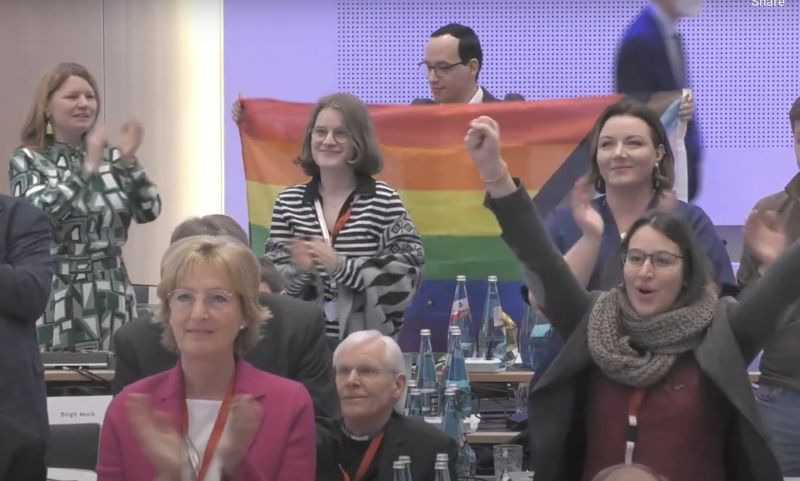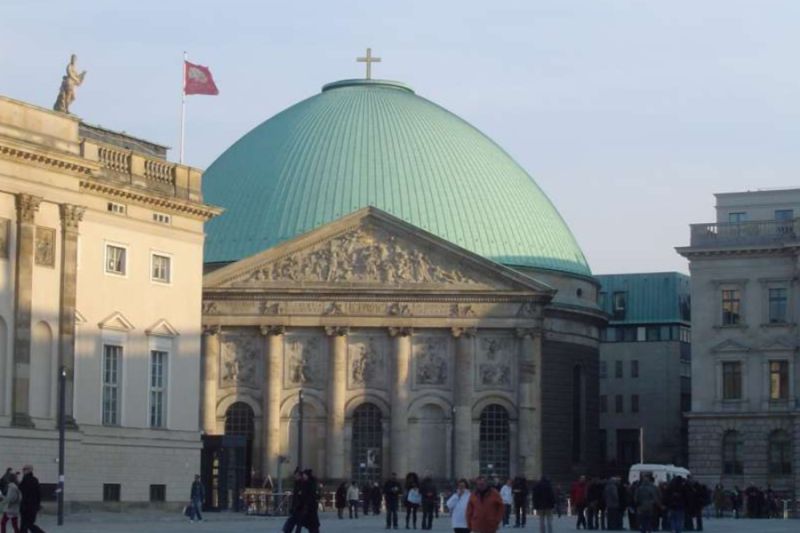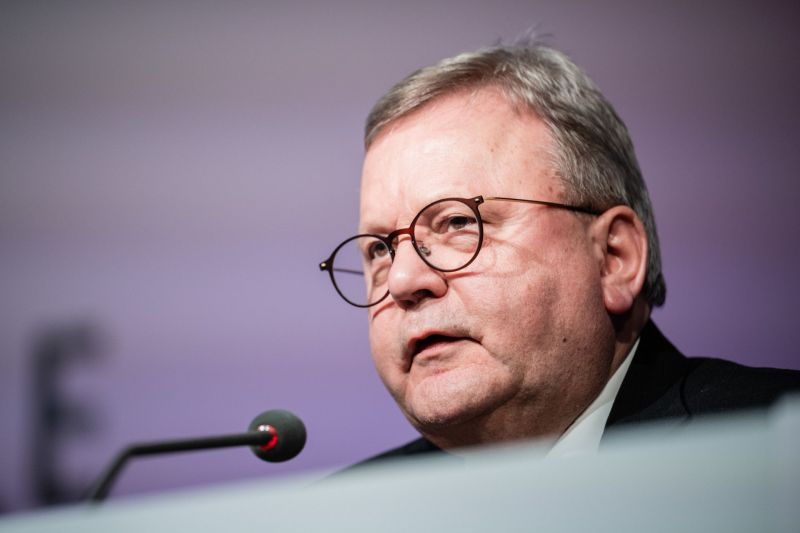 Delegates at the fifth assembly of the German Synodal Way, meeting in Frankfurt, Germany, on March 11, 2023, applaud after the he passage of a text calling for changes to the German Church’s approach to gender identity. / Jonathan Liedl/National Catholic Register
Delegates at the fifth assembly of the German Synodal Way, meeting in Frankfurt, Germany, on March 11, 2023, applaud after the he passage of a text calling for changes to the German Church’s approach to gender identity. / Jonathan Liedl/National Catholic Register
Frankfurt, Germany, Mar 11, 2023 / 07:30 am (CNA).
Delegates of the German Synodal Way on Saturday overwhelmingly passed measures to change Church practices based on transgender ideology and to push the universal Church to ordain women to the sacramental diaconate.
The votes took place on the final day of the process’ concluding assembly, held in Frankfurt March 9-11. On previous days, delegates voted overwhelmingly to adopt same-sex blessings, normalize lay preaching, and ask Rome to “reexamine” the discipline of priestly celibacy.
While the Germans pushed forward with these controversial measures, the assembly held back from crossing a line laid down by the Vatican concerning the establishing synodal councils at the national, diocesan, and parochial levels. The Vatican has said the synodal council model, which involves shared governance between bishops and the laity, is not consistent with Catholic ecclesiology.
The synodal assembly decided to delay voting on the proposal. Instead, it will be considered by a newly established synodal committee over the next three years, while Synodal Way leadership attempts to change the minds of Vatican officials and garner more widespread approval in the universal Church.
At the concluding press conference, Bishop Georg Bätzing of Limburg, president of the bishops’ conference, said that the results give a mandate to the bishops to make some changes in Germany now while pushing for broader reform.
“The Church is visibly changing, and that is important,” Bätzing said.
Irme Stetter-Karp, president of the Central Committee of German Catholics (ZdK), said the results show that the synodal path in Germany will continue.
“It does not end here. It is just the beginning,” she said.
Observers, including 103 international bishops who signed a letter warning that the Synodal Way could lead to schism, have expressed concern about the heterodox ideas promoted by the process and the effect it could have on the wider Church if the Vatican does not sufficiently intervene.
Vote on gender ideology
The implementation text “Dealing with gender diversity” passed with support from 96% of the 197 voting delegates. Thirty-eight bishops voted for it, while only seven voted against it. Thirteen abstained from voting.
Consistent with a pattern running throughout the assembly, there would have been enough votes to block the measure if those abstaining had voted against it. Critics of the Synodal Way say that organizers’ removal of the secret ballot has created a fear-driven atmosphere that has prohibited many bishops from voting freely.
The resolution calls for “concrete improvements for intersex and transgender faithful,” including changing baptism records to match someone’s self-identified gender, banning one’s gender identity from consideration for pastoral ministerial roles, and mandatory education for priests and church employees to “deal with the topic of gender diversity.” Intersex refers to people born with mixed sexual characteristics.
The text also bars “external sexual characteristics” from being used as a criterion for “accepting a man as a candidate for the priesthood,” a measure that could open the door for attempted ordinations of women.
During the debate, a small minority of bishops voiced opposition to the measure, while emphasizing that the Church should improve its pastoral care of those identifying as transgender. Auxiliary Bishop Stefan Zekorn of Bistum Münster said he could not support a text based on gender ideology, while Bishop Stefen Oster of Passau said that the document failed to emphasize that a Christian’s primary identity should be rooted in Jesus Christ.
But the vast majority of those who spoke expressed support for the measure. Gregor Podschun, the head of the heterodoxical Federation of German Catholic Youth, said the claims of gender ideology were “a scientific fact,” and that the Church’s denial was causing people to commit suicide. Julianne Eckstein, a professor of theology at the Johannes Gutenberg University of Mainz, claimed that the book of Genesis was an inadequate basis for questions of sexual anthropology. And Viola Kohlberger, a young adult from Augsburg, said that there is no “norm” for gender and that the tradition of the Catholic Church was holding back progress.
“And I would like to break it today,” she said.
When the vote passed, delegates stood to applaud, while some unfurled rainbow flags expressing support for homosexuality and transgender ideology.
Support for women’s ordination
Delegates passed the implementation text “Women in sacramental ministry: Perspectives for the universal Church dialogue” by a similarly large margin. Only 10 of 58 bishops voted against the measure, which calls for the German bishops to advance the issue of the sacramental ordination of women at the continental and universal level of the Church.
A motion adopted by the assembly replaced a call for the establishment of a “sacramental diaconate of women” with “opening the sacramental diaconate for women.” The distinction made clear that the Synodal Way is pushing for women to be integrated into already existing holy orders, an idea the Church has repeatedly affirmed is impossible.
Delegates adopted another motion that modified priorities related to the all-male priesthood, calling for the practice to be simply reexamined, rather than ended, at the universal level of the Church. Cardinal Reinhard Marx of Munich and Freising said that the motion was needed to “build consensus” for changes to the Church’s dogmatic teaching related to the priesthood.
Others were less interested in the slow approach. Several women delegates were seen in tears after the vote, saddened that the text did not more explicitly call for female priests.
“Discriminating against someone because of their gender must be put to an end in the Catholic Church,” said delegate Susanne Schumacher-Godemann.
“The patriarchy needs to be destroyed,” added Podschun.
Bishop Rudolf Voderholzer of Regensburg spoke up in opposition to the text, characterizing the push for ordaining women to the diaconate as “a first step toward opening up” the priesthood and the episcopacy, too.
The Regensburg bishop, a close friend of Pope Benedict XVI, is one of only three German bishops to have publicly voted against each of the Synodal Way’s controversial texts.
The synodal assembly also elected 20 members to the transitory synodal committee that will work over the next three years to prepare for the establishment of a permanent synodal council at the national level. The 20 elected members, which consisted of 19 laypeople and one auxiliary bishop, will join the 27 bishops who head dioceses and 27 members of the Central Committee of German Catholics (ZdK) already on the committee.
The Synodal Way, which began in 2019, has been a collaborative effort between the ZdK and the German bishops’ conference.
[…]









